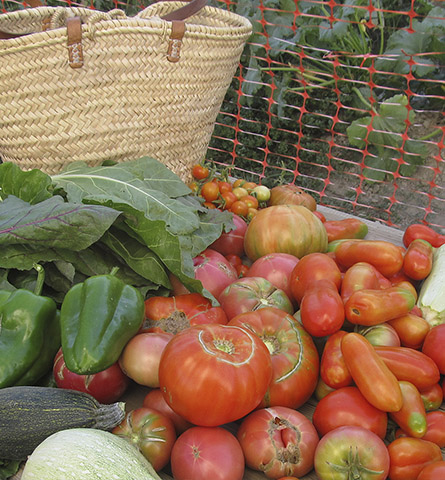Changing production patterns through training for decent jobs in local projects
One-year theoretical and practical training course held,covering competences related to the holistic integral management of gardens (understanding the entire agricultural cycle, plant varieties, composting, crop programming. In this educative programs, environmental education dimension is cross-cutting implicit in all the training, since training in ecological values is adapted to each of the trainings.




Asociación Somos Vega Somos Tierra
Association
2015
Detailed Adress is C/ Virgen Blanca (Granada, Spain) 18004, but the association activity takes place in the Vega of Granada territory Granada city and metropolitan area.
Asociación Somos Vega Somos Tierra arises as a response to the defence, protection and dynamisation of La Vega de Granada territory. It started from the premise that la Vega and the its territory need new agricultural patterns and aterritorial and human development to make it places socially and environmentally sustainable, boosting the creation of fair and dignified employment, and adopting agroecology as a tool for the protection of the natural and cultural heritage and the people who live there.
This is a one-year programme of theoretical and practical training courses in which knowledge and skills are acquired to cover all the needs for the design and management of agro-ecological gardens.
It includes the thematic training necessary to tackle an agro-ecological garden project and specialised training for the agro-ecological management of the garden (crop varieties, composting, crop programming, etc.).
In this activity, the educational dimension in environmental matters is implicit in the design of the materials themselves but also in their practice, since the resources and energy sources come from the garden itself, promoting values of sustainability, ecology, recycling, reuse and exploitation in a cross-cutting way.
This activity aims to achieve the following objectives:
Trainer competences:
Experience in agroecology with social awareness and attachment to the territory. Capacity for moderation and linking with the community…
Acquired competences:
Agro-ecological management of gardens, sustainable use of resources, territory-based agricultural skills, professionalisation of agricultural activity, solidarity economy, agro-ecological marketing.
Example of modules and target groups:
| Moving towards agroecology | Professional farmers |
| Becoming farmers | Unemployed people |
| Cultivating our food | School pupils, eldery, disadvantaged people, nature lovers, |
| Cooperative associating in agriculture | |
| Sustainable & ecological municipalities | Educational centres, associations and civil society |
| Learning sustainability from institutions: developing sustainable policies. | Policy makers, city council workers |
In order to develop the activity you will need:
Steps:
‘Training to change the model. Proposing territorial transformation projects from argoecological perspectives, hand in hand with local communities’.
The idea of this activity is that, through training, the gardens are set up as laboratories to put sustainable strategies and climate change mitigation into practice, while at the same time becoming spaces for personal and professional development from which to achieve an integral development of the area in which they are located.